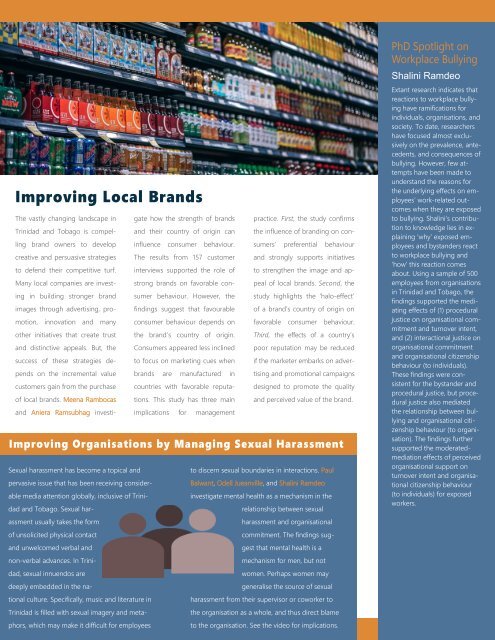Management Matters Issue 2
The Department of Management Studies' annual newsletter
The Department of Management Studies' annual newsletter
You also want an ePaper? Increase the reach of your titles
YUMPU automatically turns print PDFs into web optimized ePapers that Google loves.
The vastly changing landscape in<br />
Trinidad and Tobago is compelling<br />
gate how the strength of brands<br />
and their country of origin can<br />
practice. First, the study confirms<br />
the influence of branding on con-<br />
brand owners to develop influence consumer behaviour. sumers’ preferential behaviour<br />
creative and persuasive strategies<br />
to defend their competitive turf.<br />
Many local companies are investing<br />
in building stronger brand<br />
images through advertising, promotion,<br />
innovation and many<br />
other initiatives that create trust<br />
and distinctive appeals. But, the<br />
success of these strategies depends<br />
The results from 157 customer<br />
interviews supported the role of<br />
strong brands on favorable consumer<br />
behaviour. However, the<br />
findings suggest that favourable<br />
consumer behaviour depends on<br />
the brand’s country of origin.<br />
Consumers appeared less inclined<br />
to focus on marketing cues when<br />
and strongly supports initiatives<br />
to strengthen the image and appeal<br />
of local brands. Second, the<br />
study highlights the ‘halo-effect’<br />
of a brand’s country of origin on<br />
favorable consumer behaviour.<br />
Third, the effects of a country’s<br />
poor reputation may be reduced<br />
if the marketer embarks on adver-<br />
on the incremental value brands are manufactured in tising and promotional campaigns<br />
customers gain from the purchase<br />
of local brands. Meena Rambocas<br />
countries with favorable reputations.<br />
This study has three main<br />
designed to promote the quality<br />
and perceived value of the brand.<br />
and Aniera Ramsubhag investi-<br />
implications for management<br />
Sexual harassment has become a topical and<br />
pervasive issue that has been receiving considerable<br />
media attention globally, inclusive of Trinidad<br />
and Tobago. Sexual harassment<br />
usually takes the form<br />
of unsolicited physical contact<br />
and unwelcomed verbal and<br />
non-verbal advances. In Trinidad,<br />
sexual innuendos are<br />
deeply embedded in the national<br />
culture. Specifically, music and literature in<br />
Trinidad is filled with sexual imagery and metaphors,<br />
which may make it difficult for employees<br />
to discern sexual boundaries in interactions. Paul<br />
Balwant, Odell Jueanville, and Shalini Ramdeo<br />
investigate mental health as a mechanism in the<br />
relationship between sexual<br />
harassment and organisational<br />
commitment. The findings suggest<br />
that mental health is a<br />
mechanism for men, but not<br />
women. Perhaps women may<br />
generalise the source of sexual<br />
harassment from their supervisor or coworker to<br />
the organisation as a whole, and thus direct blame<br />
to the organisation. See the video for implications.<br />
Shalini Ramdeo<br />
Extant research indicates that<br />
reactions to workplace bullying<br />
have ramifications for<br />
individuals, organisations, and<br />
society. To date, researchers<br />
have focused almost exclusively<br />
on the prevalence, antecedents,<br />
and consequences of<br />
bullying. However, few attempts<br />
have been made to<br />
understand the reasons for<br />
the underlying effects on employees’<br />
work-related outcomes<br />
when they are exposed<br />
to bullying. Shalini’s contribution<br />
to knowledge lies in explaining<br />
‘why’ exposed employees<br />
and bystanders react<br />
to workplace bullying and<br />
‘how’ this reaction comes<br />
about. Using a sample of 500<br />
employees from organisations<br />
in Trinidad and Tobago, the<br />
findings supported the mediating<br />
effects of (1) procedural<br />
justice on organisational commitment<br />
and turnover intent,<br />
and (2) interactional justice on<br />
organisational commitment<br />
and organisational citizenship<br />
behaviour (to individuals).<br />
These findings were consistent<br />
for the bystander and<br />
procedural justice, but procedural<br />
justice also mediated<br />
the relationship between bullying<br />
and organisational citizenship<br />
behaviour (to organisation).<br />
The findings further<br />
supported the moderatedmediation<br />
effects of perceived<br />
organisational support on<br />
turnover intent and organisational<br />
citizenship behaviour<br />
(to individuals) for exposed<br />
workers.




